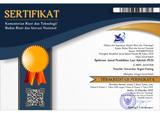The Relationship Between Disciplinary Behavior and the Number of Memorized Students (RQS) of Air Tawar Barat, Padang City
 ), Ismaniar Ismaniar(2),
), Ismaniar Ismaniar(2), (1) Universitas Negeri Padang
(2) Universitas Negeri Padang
 Corresponding Author
Corresponding Author
DOI : https://doi.org/10.24036/spektrumpls.v12i1.127605
Full Text:
 Language : en
Language : en
Abstract
Memorizing the Al-Quran is a form of worship activity carried out by Muslims, but there are things that must be considered in memorizing the Al-Quran, namely intention, enthusiasm, obedience and the ability to manage time and other activities. Therefore, the implementation process requires discipline. However, what can be seen from the students at the Sakinah Al-Qur'an House is that the students still lack discipline in memorizing the Al-Qur'an. This research uses a quantitative correlational approach to collect and analyze data. Quantitative methods allow researchers to measure the relationship between disciplinary behavior and the amount of memorization of the Al-Qur'an. The data analysis technique used in this research uses the product moment formula with a significance level of 5% (=0.05). The results of this research obtained an rcount of 0.982. The rcount value is consulted with rtable at a 5% confidence level, namely 0.349 with N = 23. The rcount > rtable value means HO is rejected and Ha is accepted. This means that there is a significant relationship between disciplinary behavior and the amount of memorization by students at Sakinah Air Tawar Barat House, Padang City. So this research confirms that students who show good disciplinary behavior tend to have a higher amount of memorization, and vice versa. The implication of this research is the importance of strengthening discipline in the context of learning the Al-Qur'an, as well as the need for awareness of the importance of disciplined behavior to achieve optimal results in memorizing the Al-Qur'an.
Keyword : Memorizing, discipline behavior, number of memorized, Qur'an House.
References
Akmaluddin, A., & Haqqi, B. (2019). Kedisiplinan Belajar Siswa di Sekolah Dasar (SD) Negeri Cot Keu Eung Kabupaten Aceh Besar (Studi Kasus). Journal of Education Science (JES), 5(2).
Aulina, C. N. (2013). Penanaman Disiplin pada Anak Usia Dini. Pedagogia, 2(1), 36–49. https://doi.org/10.21070/pedagogia.v2i1.45
Dewindo, Z. (2014). Pelaksanaan Pembelajaran di TPQ Surau Runcing Desa Timbulun Kenagarian Surantih Kabupaten Pesisir Selatan. Spektrum: Jurnal Pendidikan Luar Sekolah (PLS), II(2).
Febrianti, W., & Solfema, S. (2021). The Relationship Between Parents Attention and Early Childhood Discipline at Kampuang Jambak Kelurahan Batipuh Panjang Kota Padang. SPEKTRUM: Jurnal Pendidikan Luar Sekolah (PLS), 9(2), 226–229. https://doi.org/10.24036/spektrumpls.v9i2.112597
Friskilia, O., & Winata, H. (2018). Regulasi Diri (Pengaturan Diri) Sebagai Determinan Hasil Belajar Siswa Sekolah Menengah Kejuruan. Jurnal Pendidikan Manajemen Perkantoran, 3(1).
Hasibuan, M. (2018). Manajemen Sumber Daya Manusia. Bumi Aksara.
Nurhabibah, N. (2023). The Importance of Competency- Based Training in Improving Human Resources in the Digital Era. KOLOKIUM: Jurnal Pendidikan Luar Sekolah, 11(3), 1055–1059. https://doi.org/10.24036/kolokium.v11i3.769
Riduwan. (2012). Metode & Teknik Menyusun Proposal Penelitian. Alfabeta.
Ridwan, S. W. (2022). Penanaman Nilai-Nilai Kedisiplinan Pada Anak Melalui Permainan Tradisional (Kelereng) di Kelompok B TK Pertiwi X Belalang. Ihya Ulum: Early Childhood Education Journal, 1(1).
Rivendri, R. (2023). Training and Training Based on Field Training Model (Internship). KOLOKIUM: Jurnal Pendidikan Luar Sekolah, 11(3), 1105–1112. https://doi.org/10.24036/kolokium.v11i3.760
Sa’dullah, S. (2008). 9 Cara Praktis Menghafal Al-Qur’an. Gema Insani Press.
Salahudin, A., & Alkrienciehie, I. (2013). Pendidikan Karakter. CV Pustaka Setia.
Siska, M., Solfema, S., & Aini, W. (2018). Hubungan Dukungan Sosial Orang Tua dengan Hasil Belajar Santri di MDA Nurul Haq Nagari Cubadak Kecamatan Dua Koto Kabupaten Pasaman. SPEKTRUM: Jurnal Pendidikan Luar Sekolah (PLS), 1(2).
Sudarsana, I. K. (2015). Peningkatan Mutu Pendidikan Luar Sekolah dalam Upaya Pembangunan Sumber Daya Manusia. Jurnal Penjaminan Mutu, Volume 1, 1–14. https://doi.org/10.25078/jpm.v1i1.34
Sugiyono. (2016). Metode Penelitian Kuantitatif, Kualitatif, dan Kombinasi (Mixed Methods). Alfabeta.
Suryani dan Hendryadi. (2015). Metode Riset Kuantitatif Teori dan Aplikasi pada Penelitian Bidang Manajemen dan Ekonomi Islam. Prenadamedia Group.
Thobroni, M., & Mustofa, A. (2013). Belajar dan Pembelajaran: Pengembangan Wacana dan Praktik Pembelajaran dalam Pembangunan Nasional. Ar-Ruzz Media.
Undang-Undang Nomor 20 Tahun 2003 Tentang Sistem Pendidikan Nasional.
Zimmerman, Z., & Schunk, S. (2002). Self Regulated Learning and Academic Achievment. Erlbaum.
 Article Metrics
Article Metrics
 Abstract Views : 93 times
Abstract Views : 93 times
 PDF Downloaded : 23 times
PDF Downloaded : 23 times
Refbacks
- There are currently no refbacks.

This work is licensed under a Creative Commons Attribution-NonCommercial 4.0 International License.



